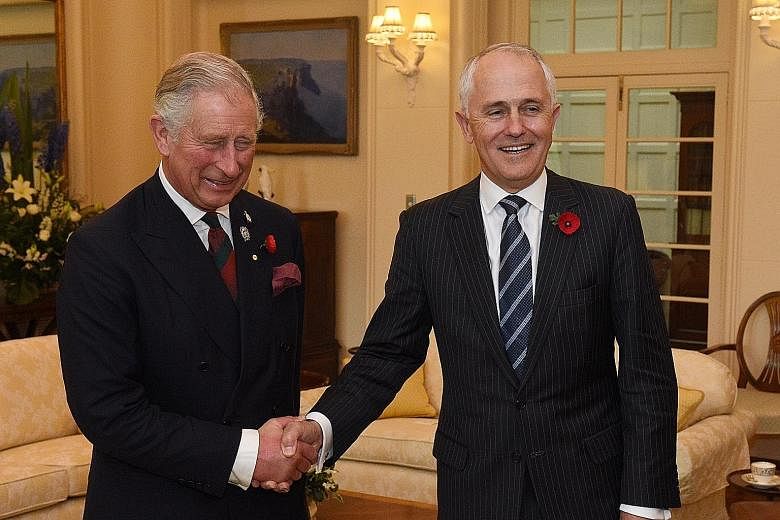Making a somewhat awkward visit to Australia's capital, Britain's Prince Charles has met Australia's new Prime Minister, Mr Malcolm Turnbull, who has spent decades leading the effort to end the nation's ties to the British monarchy.
Greeted by rain in Canberra yesterday, the Prince and his wife Camilla also landed amid growing debate in Australia about whether the nation should become a republic.
To coincide with the royal visit, the Australian Republican Movement released an opinion survey which found that 51 per cent of people would prefer an Australian head of state to "King Charles". Another 27 per cent expressed support for having King Charles as the head of state, with 22 per cent undecided.
Mr Turnbull, a former head of the Australian Republican Movement, inevitably faced questions about whether he would lead a new republican push. Despite previously claiming Australians would not want Prince Charles as head of state, he took a more diplomatic approach yesterday.
"If Charles becomes the King of the United Kingdom... unless our Constitution has been changed, he will become the King of Australia," he said.
Asked if he would be happy if Prince Charles became Australia's king, he smiled and said he was "always happy". But he added: "The opportunities for constitutional change are more challenging than for strong economic growth."
Mr Turnbull became Prime Minister in September after ousting Mr Tony Abbott, a staunch monarchist, but has signalled he will not rush to revive debate about the republic.
Most analysts believe the shift to a republic is inevitable and reflects the changing face of Australia. Mass immigration, especially from Asia, means a smaller proportion of Australians now have direct ties to Britain. Meanwhile, the nation's main security and trade partners are, respectively, the United States and China.
But the republican cause has not been a priority in recent years. Former prime ministers Kevin Rudd and Julia Gillard were committed republicans, but indicated the change should take place only when Queen Elizabeth's reign ends.
According to opinion polls, support for becoming a republic has stagnated, with about 40 per cent supporting, 40 per cent opposed and the rest undecided. This has been credited to the Queen's popularity.
But the rise of Mr Turnbull appears to have invigorated the nation's republicans. Current Australian Republican Movement head Peter FitzSimons said yesterday that "people are getting behind the idea of an Australian head of state".
"That support is only going to increase, especially if PM Malcolm Turnbull makes it a priority, as we hope and expect he will," he said.
Mr Turnbull has publicly pushed for a republic since the 1980s, and led a failed effort in the 1990s to switch to an Australian head of state. The effort ended in a national referendum in 1999, in which Australians opposed the change.
Opposition leader Bill Shorten said yesterday he would push for Australia to become a republic within a decade.
"I think Australia's ready to have its own head of state," he told ABC Radio. "I think we're an independent nation and I do believe that the debate could be handled constructively over the next number of years."
The British royal family has long made it clear that the issue of whether to become a republic is for Australians to decide.

